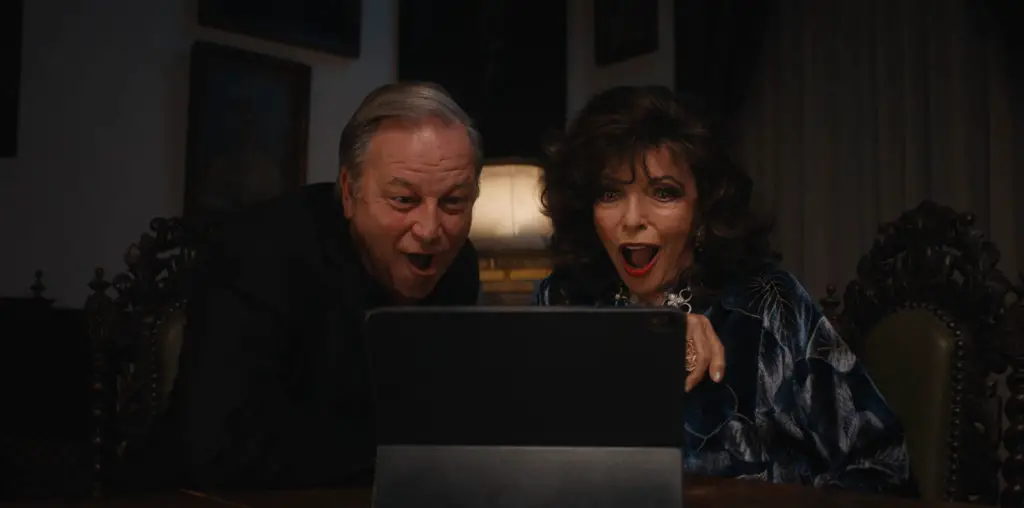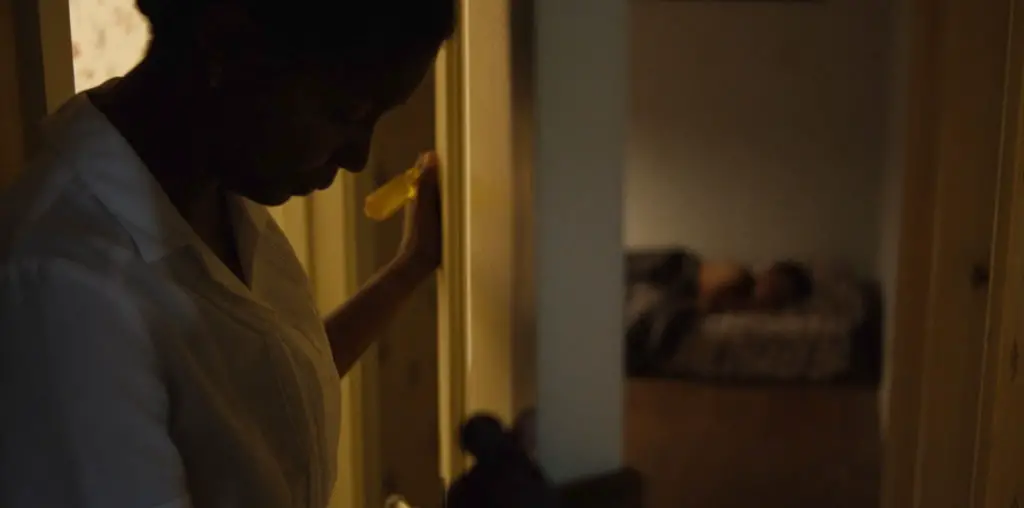
“Alright then,” grins Chris Sawyer, approaching the table with a beer in each hand, sliding one of them over to me as he settles into a chair with his own brew. “So,” he says, taking a sip. “Let’s talk about Jesus.”
“Alright. Let’s do it,” I reply. “Hey—maybe we should pray first.”
I’m joking, of course.
Sawyer and I have just seen Saved!, Brian Dannelly’s subversively-brilliant new teen comedy about born-again teenagers at an all-Christian High School. It stars Jena Malone, Mandy Moore, Patrick Fugit (of Almost Famous), Eva Amurri, and a seriously post-“Home Alone” Macaulay Culkin, and it’s absolutely hilarious, delving into the world of teenage faith with humor and insight, confronting a whole laundry list of contemporary Christian issues—friendship, homsosexuality, pregnancy, prejudice, loyalty, love, disappointing parents—and miraculously makes it all funny. Saved! is like Fast Times at Ridgemont High or American Pie, but with Bible studies, teen prayer meetings, and a pumped-up minister/principal who likes to shout things like, “Who’s down with G-O-D?”
The story takes place over a year at the fictional American Eagle Christian High, where Mary (Malone) and her best friend Hillary Faye (Moore) are the two most popular seniors, devoted young Christians who know a little less about the world then they think they do. When Mary gets accidentally pregnant—she was trying to convince her conflicted boyfriend, Dean, that he wasn’t really gay—she finds herself an outcast. Even Hillary Faye, who begins holding prayer rallies for Dean—“We pray for all the perverts, Lord,” she says—won’t speak to her, and with Dean having been sent to a Gay Recovery center, Mary finds herself taking refuge in the company of the school’s other outcasts, including Hillary Faye’s cynical, disabled brother Roland (Culkin) and gleeful troublemaker Cassandra (Amarri), the school’s lone Jew. Mary’s subsequent crisis of faith is touching and believable, and though the film ends up being pro-faith, it is clearly anti-prejudice.
“I was just fascinated with this movie,” says Sawyer. “Everyone was so real. I could have been one of those characters, easily. What am I saying? I was one of those characters.”
“You and me both,” I say.
That one was not a joke.
Chris Sawyer—a Northern California-based writer for the sensational young adult mega-magazine Wine X, and also a busy wine consultant and a skilled sommelier—became a Born Again Christian as a young man. He attended an all- Christian School in Santa Rosa where he took part in those aforementioned prayer meetings, spoke in tongues, learned the lingo—and as a teenager, eventually grew out of it. At about the age Sawyer was evolving into a broader view of faith (he minored in Religious Studies in college), I was just getting started as a teen Born Again, an experience that lasted until my own disintegration of faith in my early twenties. Sawyer and I—who’ve been bumping into one another for years at film festivals and press screenings—only recently discovered our one-time kinship in the Lord. Both agnostics now, we share a view of ourselves as “recovered Christians.” When we heard about Saved!, we made a date to check it out together, and having just seen it, everything about the film struck a major chord in each of us.
“I’m having a lot of memories, sitting here after that movie,” Sawyer says. “The fact that this movie was set in present times didn’t make it any less familiar to me. You could just change the clothes on the teenagers and it would be the same thing I experienced, the same exact dialogue coming out of these kids’ mouths, pretty much.
“But I think anyone can watch this movie and apply it to their lives,” he goes on. “Everyone has had some experience with Christianity. Either they are a Christian or have been a Christian, or they’ve had a bias against Christianity or know people who are Christian. Everyone has had some experience with Christianity, either pro or con. But to look at it through the eyes of a child—these kids weren’t children but they were very young, right? They’re high schoolers—to look at this subject through those eyes, it’s very juicy, and very illuminating.”
“I loved the moment where Jena Malone is really beginning to question her faith,” I point out, “and she stands there in front of that cross and tests the waters by starting use profanity, saying ‘S**t,’ then ‘F**k,’ and after a long dramatic pause—and you knew she was crossing a big line here—she finally says, ‘God Damn.’”
“It’s a big moment for her,” laughs Sawyer. “Most people can’t remember the first time they said ‘goddammit’. But for a teen Christian, it’s a big barrier to cross.”
“I remember the first time I used profanity,” I confess. “I was 20-years-old. and it was definitely making a choice. It was crossing a big line. Losing my virginity was less of a rite of passage than saying ‘goddamn’ for the first time.”
“You were probably waiting to be struck by lightning,” Sawyer says. “I can identify with that. It’s hard when you are taught to see things in black and white—because the real world isn’t black and white. How was I affected by my Christian beliefs and by my religious schooling? I accepted that there was sin, and that I was a sinner—the whole guilt trip thing—but then I accepted that you should do to others as you’d have them to do unto you. That’s probably the major, number one most important thing I learned from being a Christian, and as far as I’m concerned, that’s the most important piece of advice in the whole entire Christian scripture.”
“In the movie,” I interject, “the outcast kids are better at doing unto others than the Christians who cast them out.”
“And isn’t that interesting?” Sawyer says. “It was also fascinating to watch the pastor-principal guy, and to see how closed-minded he was, while this group of kids was expanding in their knowledge and their beliefs. His mind was closed, but we get to watch some of these kids as their minds begin to open. It’s a beautiful thing.”
The movie begins with Jena Malone being baptized. Sawyer says he was baptized as an 8-year-old. I was fifteen.
“To be baptized as a kid is very interesting,” Sawyer says. “It’s kind of a dangerous thing. You are being immersed into a rigid belief system right away, before you have any idea that there are any other ways of thinking or believing—and you don’t have any say in it. How is that good? You have to make your own choice how to prepare for whatever is waiting after death, if anything, and religions should let us work it out for ourselves instead of insisting that one view be accepted by all.
“At least you were fifteen,” he points out. “You knew what you were doing.”
“The problem is that teens don’t know what they’re doing,” I reply. “At least, they don’t know nearly as much as they think they do. And then these older Christians come along, get you saved, and tell you there’s nothing else you need to know about the ways of the world. They tell you the world outside of Christianity is dark and dangerous, and only within Christianity will you find true peace.”
“And that’s the big lie!” Sawyer says. “The world does have its dark side, but so does the Christian world! It’s a lie, that everything in the Christian world is beauty and light and goodness and love, and everything outside Christianity is death and pain and sadness and horror.
“Everything I thought I knew about life, everything about life that frightened me, I learned in Church,” he goes on. “A lot of it was a lie. So, what a shock when I actually began to experience life, and I learned that most of what was supposed to kill me and make me miserable and leave me all empty inside, was actually not so bad at all. In fact, sin—so-called sin—has been really good to me.”
“Praise the Lord!” I say, clinking our mugs together.
“Exactly,” Sawyer laughs. “Praise the Lord! Let’s drink to that.”
____________________________________________________________
Writer David Templeton takes interesting people to the movies in his ongoing quest for the ultimate post-film conversation. This is not a review; rather, it’s a freewheeling, tangential discussion of art, alternative ideas, and popular culture.
Discuss David Templeton’s “Talking Pictures” column in Film Threat’s BACK TALK section! Click here>>>


